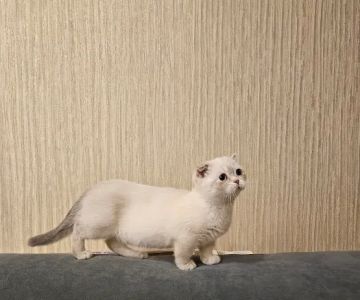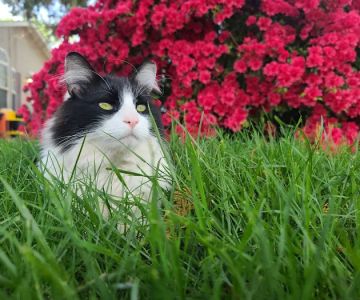How to Prevent Cats from Getting Hairballs
As a cat owner, it's always concerning when your beloved pet struggles with hairballs. Not only are they uncomfortable for your cat, but they can also be unpleasant to clean up. In this article, we will explore practical and effective ways to prevent hairballs and keep your feline friend comfortable and healthy.
1. Regular Grooming: A Key to Preventing Hairballs
One of the best methods to prevent hairballs from forming in cats is regular grooming. Cats naturally shed hair, and when they groom themselves, they ingest the loose fur. By brushing your cat's coat regularly, you help remove this excess hair before it can be swallowed. This is especially important for long-haired cats, but even short-haired cats can benefit from brushing.
There are many grooming tools available, from simple combs to deshedding brushes. You can choose the one that works best for your cat's fur type. Be sure to groom your cat at least once a week, and more often during shedding seasons, which typically occur in spring and fall.
2. Diet Plays a Vital Role
What your cat eats can significantly affect its hairball situation. A high-quality diet rich in nutrients helps promote a healthy coat and can reduce shedding. Additionally, certain foods are specifically formulated to help control hairballs. These foods typically contain fiber that aids in digestion and helps the hair move smoothly through your cat's gastrointestinal tract.
Some cat owners also choose to incorporate a small amount of wet food into their cat's diet to help with hydration, which can aid in digestion. Always consult with your vet to determine the best diet for your cat, especially if you're considering a specialized hairball formula.
3. Hydration is Crucial
Proper hydration is another important factor in preventing hairballs. When cats are well-hydrated, their digestion works more efficiently, which can help pass any ingested hair smoothly through their digestive system. Cats that are dehydrated may experience slower digestion, leading to hair accumulating and forming hairballs.
Encourage your cat to drink more water by offering fresh water daily, using a cat water fountain, or mixing wet food with dry food to increase moisture intake. Cats are more likely to drink water from a flowing source, so a water fountain can be a great investment.
4. Hairball Remedies and Supplements
There are several hairball remedies available that can help your cat digest hair more effectively. Hairball gels and pastes are often used to lubricate your cat’s digestive system, allowing the hair to pass more easily. These products typically contain oils or petroleum jelly that help hair move through the intestines. Some supplements also include fiber to help with digestion.
In addition to over-the-counter remedies, you can consider using probiotics, which promote gut health and digestion. Consult with your vet to ensure you're using safe and effective products for your cat.
5. The Importance of Exercise and Playtime
While grooming and diet are crucial, ensuring your cat stays active is equally important. Regular playtime keeps your cat physically healthy and helps maintain its weight, which can reduce excessive shedding. Additionally, exercise stimulates your cat’s metabolism and digestive system, further preventing hairball buildup.
Interactive toys like feather wands or laser pointers can help your cat stay active, but even a simple cardboard box or scratching post can encourage movement. By providing a stimulating environment, you help keep your cat healthy, and its fur in better condition.
6. Vet Visits: When to Seek Professional Help
In some cases, hairballs may become a more serious issue. If your cat is vomiting excessively or seems to be struggling with hairballs more often than usual, it might be time for a vet visit. Chronic hairball issues could indicate an underlying health problem such as gastrointestinal or skin issues that require professional attention.
Your vet may recommend a tailored grooming regimen, special medications, or dietary adjustments based on your cat's health needs. Regular vet check-ups ensure your cat stays healthy, preventing not only hairballs but also other potential issues.
Real-Life Story: How One Cat Owner Tackled Hairball Problems
Let me share the story of my cat, Whiskers, who struggled with hairballs for months. After trying various home remedies and not seeing significant improvement, I decided to consult my vet. The vet suggested switching Whiskers to a high-fiber diet and recommended regular grooming sessions. Within weeks, Whiskers' hairball problem significantly reduced, and I no longer had to clean up after frequent vomiting. It was a relief to know that with the right care, my cat could feel comfortable again.
Conclusion: Managing Hairballs for Your Cat's Comfort
Preventing hairballs is a combination of grooming, diet, hydration, and proper healthcare. By paying attention to these factors, you can ensure that your cat remains comfortable, healthy, and happy. Remember, every cat is different, and what works for one may not work for another, so it's essential to monitor your cat's condition and adjust accordingly. Don't hesitate to reach out to a veterinarian for professional advice on managing your cat’s hairballs effectively.
For the best products and services related to your cat's health and well-being, consider visiting Hidden Brook Veterinary, where you can find expert recommendations and solutions tailored to your pet's needs.











